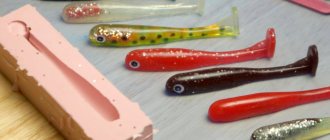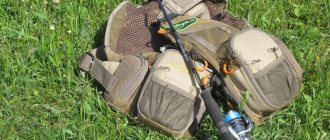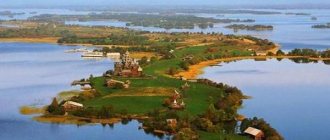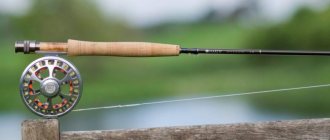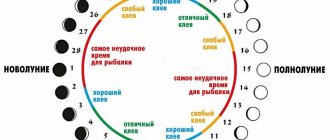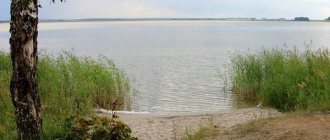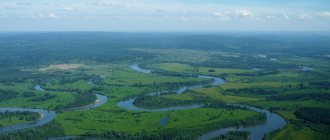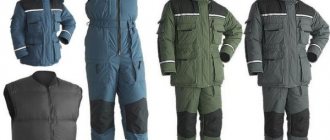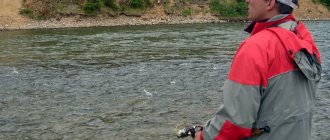Let's go summer fishing
Fishing gear according to the chosen fishing method:
- Fishing rod (float rod, fly fishing rod, spinning rod).
- Spare equipment depending on the type of fishing rod: rod, reel, main line and leashes, spools, laces, sinkers, hooks, lures, leashes, floats, springs, carabiners, sbirulino.
- Fishing rod stands.
- The cage is preferably soft so that you can put it in a backpack.
- Net or landing net.
- A release for rescuing bait that is caught on a snag.
- Kukan for preserving and transporting fish.
- Lures – natural and artificial.
- Artificial baits made of silicone, foam rubber, jigs, flies, cambrics, spinners, Devons, wobblers, panagras for bloodworms.
Bait:
- dung worms, earthworms, water worms;
- live bait (small fish, used to catch predators);
- maggots, bloodworms, jigs, caddis flies;
- insects and their larvae;
- leeches, slugs, frogs, tadpoles, fry, cutting;
- attachments made from bread, flour, potatoes, corn, etc.;
All baits should be packaged in jars or boxes, tightly closed so as not to spill.
Lure:
- Yawner to open the pike's mouth and safely remove the hook, extractor.
If you decide to take a boat with you:
- spare parts in case of breakdown;
- pump, motor;
- petrol;
- motor cord;
- oars;
- boat documents, permit;
- anchor;
- rope;
- life jacket;
Add. items:
- Backpack or duffel bag.
- Bucket for storing fish. You can take a folding, canvas, soft rubberized one.
- Rag , towel.
- knife or in a case.
- Compass, map of the area if you plan to fish in an unfamiliar place.
- Change bag.
- Small things: a flashlight, batteries for it, a needle and thread. A needle will help you pull out a splinter, threads just in case.
- Rope , cord, electrical tape.
What to sit on:
- A chair, preferably a folding one.
- A soft mat, a tourist mat or a foam rubber mat for fitness is best.
Tools:
- Axe, mining shovel, pliers, wire cutters, hacksaw. A multitool that has most of the tools, including a knife, is best suited.
First aid kit:
- You can use a motorist's first aid kit.
- It should contain: iodine, brilliant green, peroxide, a tourniquet, a bandage, including an elastic one, cotton wool, and a plaster.
- Antiallergic, analgesic, cardiac drugs, adsorbents.
Additional items:
- In case of rain - raincoat and umbrella.
- Panama hat, sunglasses.
- Waterproof footwear: rubber boots, fishing boots.
- Two pairs of gloves, rubber and cotton.
- Swimming trousers.
- Remedies for various insect bites.
- Ointments, repellents that repel mosquitoes, midges, ticks, etc.
- Mosquito net for face.
- Clean drinking water in a flask or thermos. You can buy a hydration pack, or camel, which fits like a backpack on your shoulders and has a special drinking straw.
- Garbage bags. Let's not forget about the environment.
- Hygiene products: toilet paper, soap.
- Documents: passport, if for a car – driver’s license.
- Telephone. Charging for it.
If you are going to start a fire:
- firewood
- paper, matches, lighter;
Non-essential items:
- Dishes . Take a disposable one, it is lighter and can be thrown away after use.
- A pot , fastenings for it, a teapot, a basin, a bowl, a cutting board.
- Dishwasher , sponges, napkins, can opener.
Products:
- It is advisable to take those that cook quickly and do not spoil for a long time.
- Stewed meat, bread or crackers, lard, canned food, sausage, tea, sugar.
- If you are going to cook fish soup, then take all the necessary vegetables: onions, carrots, potatoes, millet. From spices, salt, from spices, ground black pepper and peas, bay leaf.
- If you are going to barbecue, then barbecue meat, marinade, grill, skewers, lighters, charcoal.
To capture memorable moments:
- photo;
- video;
- camera;
Things you need for fishing
If you plan to get to the fishing spot on foot, by bus or hitchhiking, then you need to pack only the most necessary things. It is worth paying attention to the weight of the backpack; it will be difficult for the fisherman if its weight exceeds 20 kilograms.
When going fishing in the warm season, do not forget about a warm sweater and raincoat, as very often the weather can be deceptive and a clear sunny sky can suddenly give way to thunderstorms and heavy rain. But it can also remain sunny, which is why you should definitely make room in your fishing backpack for sunglasses, a cap and sunscreen.
Provided that you stay overnight for fishing, you will definitely need a sleeping bag, a tent and, of course, a blanket. The availability of a blanket depends on the time you go fishing; of course, you are unlikely to need it in winter.
Indispensable things for fishing will be a watch, a flashlight, matches and paper. If fishing is supposed to be in unfamiliar terrain, then it is advisable to have a compass and a map of the area with you.
It is much more convenient to wait for a bite while sitting on a chair rather than on damp ground. So it’s worth setting aside space in your backpack and for a high chair. After all, it’s better to carry an extra kilogram on your back than to treat hemorrhoids later.)
Now let's take a closer look at the clearly formed list. And so, below are the things you need for fishing. Of course, everyone can change this list to suit themselves; some will find some attributes unnecessary, while others will need many more things. And now closer to the point, the list of things for fishing:
- Be sure to take gear with you: fishing rods, groundbait, bait, landing net, cage. Mandatory things when fishing are spare tackle and its elements (line, hooks, float, sinkers), because no one is safe from cliffs;
- Now about clothes, first of all, you should choose clothes for fishing according to the weather. As mentioned above, a cap will be a very useful thing when fishing. Do not forget that it is always colder near the water than it might seem at first glance;
- Be sure to bring drinking water with you;
- Soap;
- First aid kit. Iodine, bandage, cotton wool, adhesive plaster, anti-allergic agent - the most minimal set in a fisherman’s first aid kit;
- Don’t forget the anti-bite remedy, mosquito bites have never been canceled. Vanilla dissolved in water and rubbed into the skin helps very well with folk remedies, and the smell is pleasant and mosquitoes do not bite;
- Now to the little things: a hatchet, a knife, a mining shovel. Flashlight, matches or lighter, paper, watch. If you're fishing at night, don't forget about spare batteries for your flashlight. And of course, a high chair;
- Tent, sleeping bags (their number depends on the number of fishermen) and warm clothes for sleeping;
- Well, don’t forget about food, this is at the discretion of the fishermen themselves;
Getting ready for winter fishing
Fishing equipment:
- Fishing rods , spinning rods, rods. Choose a rod that is short and lightweight.
- Hook for big fish, feeders, jigs, bait, attachments, bait, cage, landings.
Spare parts for fishing rods:
- Ice drill with several augers in reserve. They use it to drill holes in the ice.
- Ice pick. An ice pick can also be used to punch holes, and it also serves to test ice for fragility.
- Scoop , ladle, sump ladle.
To scoop ice chips from holes:
- Winter fishing box. You can sit on it, you can put accessories in it.
- Chipper release.
- Depth gauge for measuring the depth of the bottom of a reservoir. You can do it yourself by tying knots on a long rope every meter, with a sinker at the end of the rope. You can buy an echo sounder.
Clothing that will protect you from cold and wind:
- Ushanka, knitted hat.
- A pair of woolen mittens and woolen socks.
- We put one pair on, and put the second one in reserve in the backpack.
- Face mask to prevent frostbite on your skin.
- Splurge on a khaki winter fishing suit with overalls and thermal underwear underneath. You don't have to dress like a cabbage and your movements won't be constrained.
- On the feet are felt boots with galoshes.
Additional equipment:
- Tent for more convenient fishing. It is best to use an umbrella tent; do not forget the additional attachments to it. Choose a tent with bright colors as it will be more visible.
- Rope , candles, lantern.
- Firewood, coal for fire. Lighting paper.
- A sled , wooden or plastic, used to drag caught fish across the ice.
- Lifesavers or fishing claws are worn around the neck. Hide the ends in your pockets so as not to get in the way. The claws will help you if you fall through the ice.
- Backpack.
- First aid kit.
- Thermos with hot tea.
Wrap the products in cling film. The most convenient way is to take sandwiches.
How to prepare for fishing
The process of preparing for fishing is quite a responsible activity and often brings fishermen the same positive feelings as the fishing process itself. Experienced fishermen know how to properly prepare for fishing; they decide on the fishing location and the desired trophy in advance. And long before going fishing, the process of preparation and careful planning begins. Fishermen already know what they will fish, where and with what bait.
Very often when fishing, people encounter force majeure situations, and emergencies often occur. The most important thing is to check the serviceability of the vehicle before fishing if you plan to travel on it. After all, no one wants to push the car instead of watching the float.
Don’t forget to check all electronics that will be used during fishing. It is recommended to take a car charger for your phone or power bank.
Be sure to pack a separate box with spare gear. Be sure to prepare the bait in advance.
When preparing for fishing, many people buy bait mixtures in stores, but some still make them themselves. It is not uncommon for groundbait prepared at home to be cake with flour or corn grits with fixatives.
A very important thing in a fisherman’s backpack is the fish tank; never forget it. The presence of a cage will always ensure the safety of the catch and all the fish will be alive. Do not forget that there are a lot of mosquitoes and other insects in the reservoir, so when going fishing you should pay attention to the selection of insect repellent. It is also mandatory to have a first aid kit, at least with the most necessary items (iodine, bandage, cotton wool, adhesive plaster, antiallergic agent, antipyretic).
And of course, don’t forget about food, there should be enough of it. It is necessary to allocate space in your backpack for a knife and matches. The main thing is not to rush when packing for fishing; for convenience, you can make a list.
Preparing for summer fishing
Preparing for fishing in the summer is a little easier than at other times of the year, and fishing is much more interesting and enjoyable. For successful and comfortable summer fishing, you need to prepare things from the following list:
- clothing (preferably waterproof) and hat;
- shoes;
- bag - thermos to ensure a low temperature of the bait (so that the worms do not die);
- insect repellent;
- an umbrella (to hide at least a little from the sun);
- Sunglasses;
- sun cream;
- first aid kit, flashlight, matches and knife;
- fishing gear, the choice of which is made according to the chosen fishing technique;
- landing net and cage;
- high chair or stool;
- food and drinking water.
It is recommended not to go summer fishing without a compass and map. The list can be supplemented based on additional preferences. Some fishermen will consider the items on the list unnecessary, while some, on the contrary, will say that they are not enough.
Preparing for winter fishing
If fishing is planned in the winter season, then the list of items needed for fishing needs to be approached in a slightly different way. List of the most necessary things for winter fishing:
- warm clothes (must protect from wind and moisture);
- warm hat;
- mittens (preferably two pairs);
- warm shoes;
- spare socks;
- ice pick (to test the strength of ice while moving on it);
- ice screw;
- a scoop (necessary to clean the holes);
- fishing box or chair;
- backpack;
- thermos with hot drink;
- food;
- tent;
- kindling for a fire;
- rope and fasteners - in case someone falls through the ice;
- tackle;
- first aid kit
If you go fishing by car, then a sled will be a very useful thing; it makes it much easier to move on the ice and transport gear to the fishing spot.
Things for an overnight stay
If fishing involves overnight stay:
- sleeping bag;
- tent;
- cot;
- bedding: pillow, blanket, mattress, possibly inflatable;
- warm, waterproof clothing;
If you want to camp by the river.
- tent tent, wedges;
- sleeping bags
- folding table, chairs;
- oilcloth on the table;
- table under the stove;
- gas burner, gas cylinder;
- chainsaw, gasoline;
- wash basin;
- water filter;
- dishes, scales, barbecue, grill.
- clothes for a change;
Tips for beginner fishermen
- You need to prepare for fishing in advance, at least a day in advance.
- Take only necessary things with you.
- Look on the Internet for the weather forecast for two to three days in advance.
- Decide on your future fishing location. Take experienced fishermen as assistants.
- Take care of bait and gear in advance. Place baits and baits neatly in separate boxes.
- Take warm clothes with you both in winter and summer, as the weather is usually changeable.
- For beginners, float fishing with one rod is more suitable.
Poor preparation for going outdoors, lack of a real assessment of your capabilities can play a cruel joke on you and ruin your vacation. To avoid this, you can use our list of recommendations, or you can add to it at your own discretion.
We wish you a successful bite!
Useful household items
In addition to gear, you will need a large number of various household items. Start collecting them at least two days in advance, since getting ready for fishing is a little more difficult than getting ready for hunting.
The hunter is forced to move around a lot in the forest, so he cannot take many things with him. A fisherman has to spend many hours in one place and simultaneously solve many economic problems. Among them are the preparation of live bait, periodic replacement of gear, organization of minimal lighting when fishing at dusk, etc. So the following will definitely come in handy when fishing:
- sharp hunting knife. It must be worn in a sheath, on a belt;
- folding or penknife;
- flashlight with several spare batteries;
- a special thermometer for checking water temperature;
- rope or skein of household twine;
- several packs of waterproof matches;
- flint or tinder;
- camping pot;
- traveling spoon and fork.
Many city dwellers like to go fishing away from the bustle of the metropolis, in remote and deserted areas. If you don’t know how to properly pack for fishing so as not to get lost in an unfamiliar area, be sure to take a compass with you. It will help you find your way if you get lost on the way to the reservoir.
Are you planning to go fishing by car? Then a navigator with detailed maps of the area will definitely come in handy. If you're wondering what to take with you on a car trip, don't forget about fuel. Many reservoirs are located far from busy roads and populated areas, so refueling may be difficult.
You will also need a thermal bag. Thanks to it, live bait (for example, maggots) will not deteriorate in hot weather.
